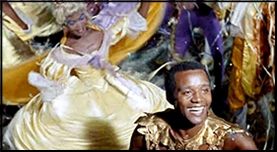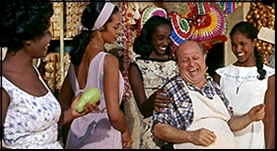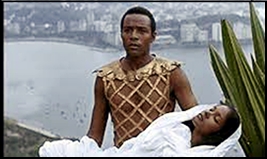Sun 1 Nov 2020
A Movie Review by Dan Stumpf: BLACK ORPHEUS (1959)
Posted by Steve under Films: Drama/Romance , Reviews[3] Comments

BLACK ORPHEUS. Dispat/Tupin, Brazil, 1959. Original title: Orfeu Negro. Breno Mello, Marpessa Dawn, Lourdes de Oliviera, and Ademar da Silva. Written by Marcel Camus & Jacques Viot, based on the play Orfeu da Conceição by Vinicius de Moraes, which is itself an adaptation of the Greek legend of Orpheus and Eurydice. Directed by Marcel Camus. Winner of Oscar® for Best Foreign Language Film at the 32nd Academy Awards in 1960.
Costumes, celebration, death and voodoo — could any film be more fitting for Halloween?

Yes, I know it’s paternalistic, simplistic, and slowed down by too many overlong dance scenes, but the sheer vibrant energy and romantic urgency of the thing sweeps me along with the uncluttered story-line: A beautiful young Eurydice comes to Rio at Carnaval, fleeing Death. She is temporarily rescued by Orpheus, but in the end, he must seek his love in the next world.
The simple story is conveyed with memorable visuals. The shanty-towns of the city seem to hang on cliffsides as precarious as the pursuing death, the costumes glitter and shimmer in the sun, and Death itself (athletically portrayed by Ademar da Silva) moves with a coiled grace that makes me wonder if the creators of Spider-Man (whoever they may be) were inspired by his lithe and lethal acting.

Just as striking is Orpheus’s descent into the underworld, wandering empty corridors until a benign Janitor — Charon, with a broom instead of a barge pole — guides him down a staircase of infinite emptiness to a hellish voodoo world where the myth must play itself out once again.
Like me, you may be used to thinking of Halloween movies in terms of Karloff, Lugosi, Universal and Lewton. Or you may be of a generation that equates Horror Movies with serial slashings and CGI monsters. But I found Black Orpheus the equal of these, and in its own way, better than most.
Need more? Actors Breno Mello and Marpessa Dawn, the star-crossed lovers of the film, died within weeks of each other, and Ademar da Silva died on the same day as the composer of the film’s justly-celebrated score:
November 1st, 2020 at 4:48 pm
A stunning film and interesting to watch in comparison to Cocteau’s dream like retelling of the myth.
This is gorgeous to watch and compellingly acted. Indeed it is a perfect choice for Halloween, certainly for anyone who has never seen it.
November 1st, 2020 at 11:34 pm
The theme, Manha de Carnaval, has been recorded over 500 times. The version with English lyrics is A Day in the Life of a Fool.
November 2nd, 2020 at 7:16 am
I was going to mention that yesterday too. Beautiful song, terrific movie.